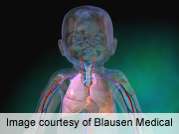Pending malpractice litigation may bias parents' reports

(HealthDay)—Following neonatal brachial plexus palsy, medical malpractice litigation is associated with worse parent reports of their child's function and pain, according to a study published in the March 5 issue of The Journal of Bone & Joint Surgery.
Emily A. Eismann, from the Cincinnati Children's Hospital Medical Center, and colleagues identified 334 patients (aged 2 to 18 years) with neonatal brachial plexus palsy. Parent or patient-reported outcomes, as measured by the Pediatric Outcomes Data Collection Instrument, were compared for families with and without medical malpractice litigation.
The researchers found that 22 percent of the patients were plaintiffs in medical malpractice lawsuits. Compared with the non-litigation cohort, in the litigation cohort, parents reported their children to have worse mobility (P = 0.04), sports or physical function (P = 0.003), and global function (P = 0.02). After adjustment for patient age and injury severity, compared with children of parents in closed lawsuits, parents in active lawsuits reported their children to have greater pain (P = 0.046). A significant difference was seen in outcome scores simultaneously obtained from patients and parents in the litigation cohort, with parents reporting worse upper-extremity function (P = 0.03) and global function (P = 0.008) than their children.
"Litigation status should be considered a confounding variable in the use of parent-reported outcomes in neonatal brachial plexus palsy research," the authors write.
One or more authors disclosed financial ties to an entity in the biomedical arena.
More information:
Abstract
Full Text (subscription or payment may be required)
Editorial
Copyright © 2014 HealthDay. All rights reserved.


















